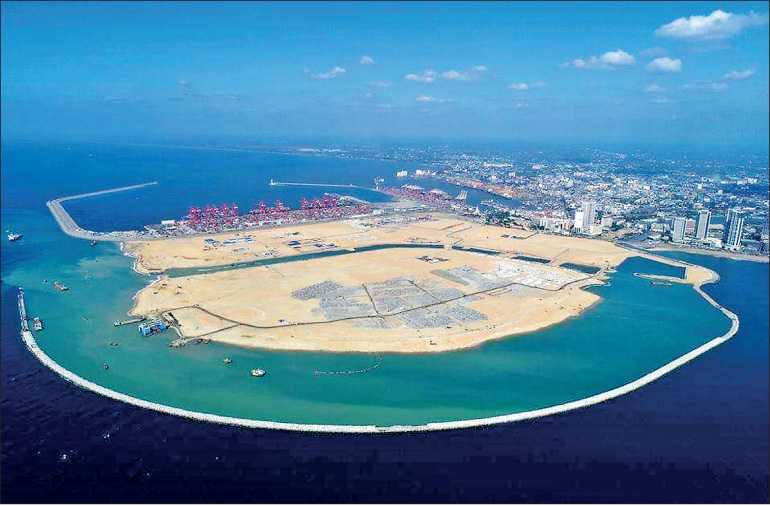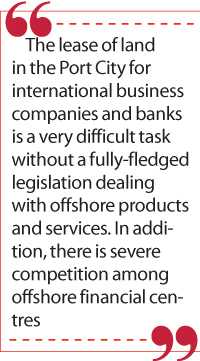Friday Feb 27, 2026
Friday Feb 27, 2026
Thursday, 27 August 2020 00:00 - - {{hitsCtrl.values.hits}}

As described by Liang Thaw Ming at the Economic Summit 2018, the design of the Port City in Sri Lanka is unique. The Master Plan of the Port City was released to the public in April 2018. It has 266 hectares to build offices for offshore banks, trusts and international companies, condominiums with time-shares, parks, international hospital and recreational facilities
Background
Port City and the Colombo International Financial Centre (CIFC) has been a topic of discussion at various conferences. Out of these conferences, the 18th Economic Summit of the Chamber of Commerce 2018, Ambassadors Forum 2018 and the Bar Association (BASL) National law Conference 2020 shed some light on the topic which can be of value.
It is proposed in this article to evaluate the present status of the Port City and the CIFC in the context of COVID-19 and thereafter propose a proper legislative design to attract investors to Sri Lanka. In my experience, it is an absolutely important project.
At the outset, it is useful to give a description of the Port City and also a description of other offshore financial centres. And thereafter I will provide a legislative design taking into account the financial constraints created by COVID-19 with a view to creating confidence in high net worth individuals, banks and offshore companies with a clear legislative mandate.
Description of the Port City
As described by Liang Thaw Ming at the Economic Summit 2018, the design of the Port City in Sri Lanka is unique. The Master Plan of the Port City was released to the public in April 2018. It has 266 hectares to build offices for offshore banks, trusts and international companies, condominiums with time-shares, parks, international hospital and recreational facilities.
It will have a beach facility of 200 metres with a marina for those who wish to visit the Port City in Colombo in their yachts. In many offshore financial centres, the high net worth persons do visit and live long periods, so that they will be able to reduce their tax burden in their home countries by being non-resident expatriates.
In his presentation, Liang said the Port City will provide high end jobs for professionals at various levels and also jobs for secretaries, auditors, etc. He also said that it will have a multiplier effect on the local economy. At the end of his presentation, he said that the glass will be half full by 2020 and the other half will be filled by investors and corporate clients by building offices, condominiums, hospitals, etc. according to the Master Plan.
At the end of Liang’s presentation, there was a heated discussion between the moderator Peter de Almeida and Dr. Harsha de Silva regarding the viability of the Port City as a development strategy. Peter de Almeida said that the Port City is likely to end as a “ghost city”, as Sri Lankans do not have the capacity and the knowhow to deal with such a financial centre. Dr. Harsha reiterated with equal force and said that it will not be so, as there is a prime need for a financial centre in the Indian Ocean to serve the Indian cities in South Asia and other high net worth persons and corporate clients belonging to ASEAN countries. I do not agree with Peter de Almeida nor with Dr. Harsha de Silva, as there is room for a new strategic player in this region with modern facilities and technology to provide financial services, investments, logistic planning and loan facilities by reputed offshore banks and offshore trusts, not only to Indian enterprises but also to many other enterprises beyond Asia.
Comparison with other Port Cities and offshore financial centres
At the outset, it is useful to compare the proposed Port City and the Colombo International Financial Centre with other port cities and offshore financial centres in the world, although the Colombo International Financial Centre is not yet operational and the proposed legislation of the financial centre is not yet made public. In Latin America and the Caribbean, there are many Port Cities and offshore financial centres. These centres are in the Panama, Antigua and Barbuda, St. Kitts and Nevis, Cayman Islands, Aruba, St. Maarten, St. Vincent and the Grenadines, The Bahamas and the British Virgin Islands. I was privileged to visit these centres and draft laws relating to registration of ships, marine pollution and various offshore products and services.
The Bahamas, the Panama, Cayman Islands and the British Virgin Islands (BVI) stand out as successful offshore financial centres. In the Bahamas, the Offshore Banking and Trusts Act of 1996 has attracted several international investment banks and trust companies to their shores. In the BVI, the International Companies Act of 1993, described as a mini-Delaware, has been instrumental in incorporating over one million companies from all over the world.
Panama has many ships registered under the Panamanian Flag and she has the highest ship weightage in the world and many Sri Lankans work as seafarers in such ships. This was the dream of the late Lalith Athulathmudali, who was willing to provide registration of ships with the Sri Lankan flag and encouraged young Sri Lankans to become seafarers. Unfortunately, this dream was not realised. In the Cayman Islands, deposit of funds by high net worth individuals is used for syndicated loans and some of them are also invested in Stock Exchanges in the developed world.
In Europe, the outstanding Port Cities are Dublin, Channel Islands, Isle of Man, Cyprus, etc. in relation to offshore banks and trusts which have played a catalytic role in the development of their economies.
In the Middle East, Dubai with her Atlantic Port City stands out as a Port City offshore financial centre, although their legislation may not be suitable for us. Qatar is also an important player in this region. These financial centres are well organised and they do enter into contracts with the prospective investors to abide by their rules and regulations (Law No. (9) Of 2004 In respect of The Dubai International Financial Centre). Indian Ocean state Mauritius is likely to be a strong competitor, as she has the blessings of India for high net worth Indian investments.
In East Asia, Labuan stands out as a successful offshore financial centre with an 18-hole golf course, several parks, and recreational activities within the Port City facilities. In Labuan, offshore products and services are dealt exhaustively by legislation and some legislative innovations constitute good legislative precedents.
At present, Sri Lanka has offshore financial services in a limited manner to serve non-citizens and non-resident Sri Lankans, although Sri Lanka is not recognised as an offshore financial centre by the Offshore Directory. In Sri Lanka, offshore banking is regulated by the Banking Act 1988 and Offshore Companies legislation in Chapter VII of the Companies Act 2007.
It must be noted that London, New York, Delaware, Singapore, Hong Kong and Tokyo are international financial centres where the dichotomy between offshore and inshore do not exist. Hence, they stand on a different pedestal as International Financial Centres.
Design of the legislation relating to the Colombo International Financial Centre
Design of the legislation relating to the Colombo International Offshore Financial Centre (CIFC) is of paramount importance to attract investors, high net worth persons and corporate clients who may consider establishing offices, hospitals and condominiums in Sri Lanka for the rich and the famous. At times, legislative infrastructure is more important than the physical infrastructure. Justice Frankfurter also said that those who draft such legislation must have an intimate knowledge of the subject matter and skills equal to the policymakers.
Designing such legislation must be done very carefully to attract the international business companies, banks and trusts. Many high net worth investors read such legislation very carefully before investing in a particular State. In my view, it is appropriate to offer a few offshore products and services with a shorter Parliamentary Act and longer executive regulations, as Sri Lanka is starting on a clean slate. Hence such legislation may take the following form and structure into consideration:
Concluding remarks and recommendations
In concluding, it must be said that the proposed Colombo International Financial Services Authority should operate closely with the Central Bank, the Registrar of Companies, and the Director General of Customs, so that institutional infrastructure at the Regulatory Authority is not bloated with unnecessary staff and unwanted expenditure. Foreign direct investments into the Port City for infrastructure investments and tax exemptions for product and services need to be marketed as soon possible as it has been delayed due to Yahapalanaya government.
Unfortunately, at the BASL National Law Conference on Port City (2020), the emphasis was placed on FDI for infrastructure and not on offshore products and services. It is unlikely that international banks, trusts and international business companies will come to Sri Lanka unless they are provided with attractive tax regime to do offshore business with India, China and the rest of the world.
In concluding, it must be said that operating an offshore financial centre is a very competitive business. The lease of land in the Port City for international business companies and banks is a very difficult task without a fully-fledged legislation dealing with offshore products and services. In addition, there is severe competition among offshore financial centres. Furthermore, the developed countries have opposed and placed impediments on offshore financial centres as they impact on their tax revenue.
However, the geographical location of the Port City in the maritime Silk Route of China is certainly a comparative advantage for Sri Lanka as compared with other offshore financial centres emerging in the Indian Ocean. We need thank China for this grant.
It is recommended that Sri Lanka should train our financial intermediaries, accountants and lawyers and equip them to deal with offshore financial services. Most officials in Latin America and the Caribbean follow various courses organised by universities in Florida. The Bankers’ Training Institute should revive its courses on Offshore Practice and Administration.
It is also recommended to use Sri Lanka’s Foreign Service personnel with communication skills to entice international banks, high net worth persons and other investors to the offshore financial centre in the Port City. Excellent brochures must be developed as in other offshore centres to assist them in their endeavour.
Port City and the Colombo International Financial Centre are likely to be a game-changer for Sri Lanka in the 21st century, despite the impact of COVID-19. In this context, Sri Lanka must outline the tax regime for offshore banks, trusts and international companies with clarity, so that investors will be attracted to Sri Lanka. As a Chinese proverb says, a journey of 1000 miles starts with the first step. Hence, the enactment of a good piece of legislation is the first step in the right direction.
References
The writer was formerly UN Legal Expert and Legal Draftsman to several Caribbean countries. He was also Commonwealth Legal Expert to the Caribbean Community (CARICOM) Secretariat in Guyana, South America. He has drafted legislation relating to offshore banks, trusts and offshore companies. He has also participated at many conferences on offshore products and services with law firms across the world.